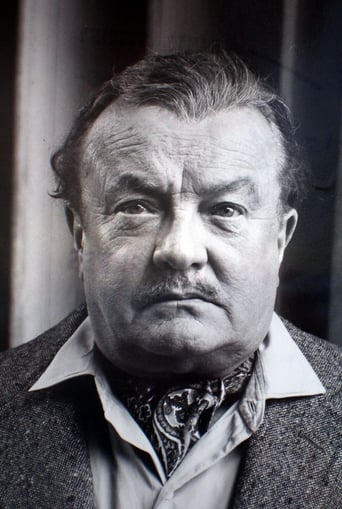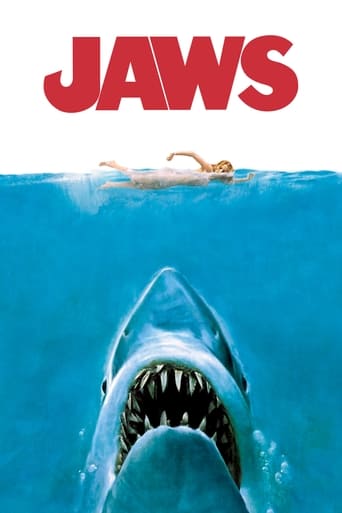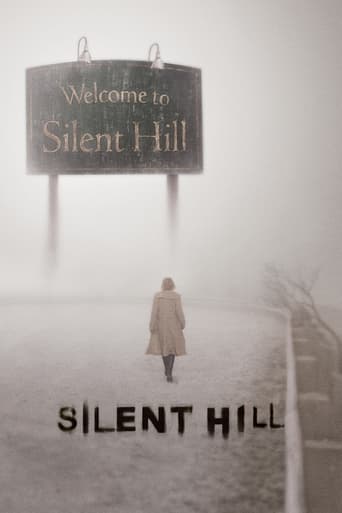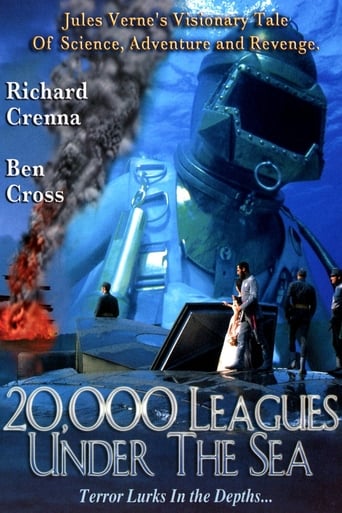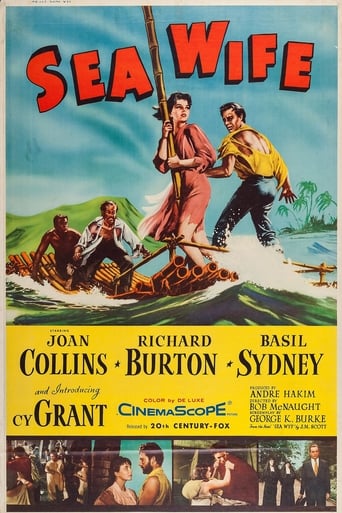
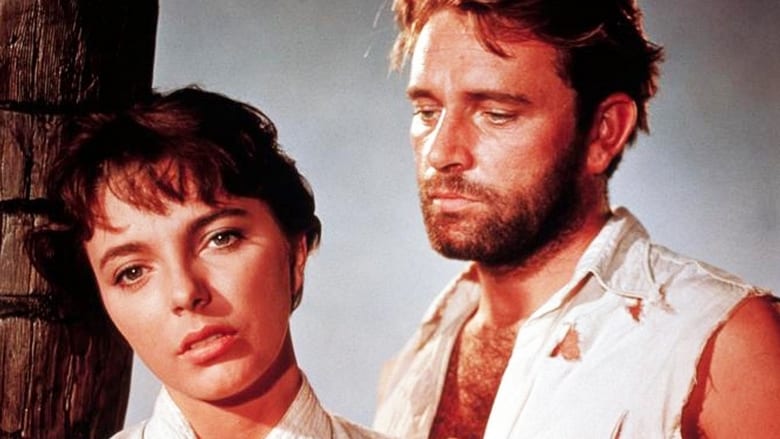
Sea Wife (1957)
In 1942, a cargo ship jammed with British evacuees from Singapore is sunk by a Japanese sub. A small lifeboat carries a beautiful woman, an army officer, a bigoted administrator, and a black seaman. Only the seaman knows the woman is a nun. The men reveal their true selves under the hardships of survival. Told in a too-long flashback frame.
Watch Trailer
Cast


Similar titles
Reviews
Such a frustrating disappointment
It's no definitive masterpiece but it's damn close.
Although I seem to have had higher expectations than I thought, the movie is super entertaining.
The film never slows down or bores, plunging from one harrowing sequence to the next.
Producer: André Hakim. A Sumar Films (London) Production. Copyright 1957 by Alma Productions, Inc. Released through 20th Century-Fox. New York opening at RKO neighborhood cinemas: 4 December 1957. U.S. release: August 1957. U.K. release: 6 May 1957. Australian release: 21 November 1957. 7,329 feet. 81 minutes.Based on the 1955 novel, "Sea-Wyf and Biscuit", by J.M. Scott, this movie version is but a pale shadow of the novel, its plot retained but its characters watered down and its conflicts made pointless. Worse still, it is directed and played in the most listlessly lackluster fashion. Yes, a huge disappointment all around. In fact, it's a downright tedious bore, and deserves a prominent place on any gallery of the worst films ever made! OTHER VIEWS: You don't need to bother to see the film. Just look at the poster. Not only does it give the whole story away, it's positively more entertaining than the actual movie. This business on the poster that asks us if the Joan Collins character is a nun, for instance. No need to worry about an answer on that score! Of course, she is! Otherwise, what's the whole point of making this movie?Equally fascinating is this "introducing" Cy Grant business. Never mind about his role in "Safari" (1956). But what happened to him after this disaster in "Sea Wife", that's what I'd like to know? - JHR writing as George Addison.
In the 1950s Joan Collins made two films in which she played a survivor of a shipwreck; in both she is marooned on a deserted island along with three men. The first was that fatuous "comedy" "Our girl Friday", aka "The Adventures of Sadie" from 1953. "Sea Wife" from four years later is essentially an attempt to make a serious drama out of a similar scenario.The film opens in London during the years immediately following the end of the Second World War. A young man signing himself "Biscuit" places advertisements in the personal column of various in which he asks a woman referred to as "Sea Wife" to get in touch with him. He never, however, receives a reply from her, and their story is told in flashback. The scene shifts to Singapore in 1942. The young man, whose name is Michael Cannon, is one of a group of British refugees trying to flee before the city falls to the Japanese Army. His ship is torpedoed by a Japanese submarine and he finds himself on a life-raft with two other men and a young woman. After a number of adventures the four survivors end up on a deserted island.The four are known to one another by nicknames; Cannon, whose nickname is "Biscuit", is the only one to reveal his true identity to the others. The woman is "Sea Wife", from an archaic word for "mermaid". The two other men are "Bulldog", a middle-aged British colonial, and "Number Four", the ship's black purser. On the island there are two developments. A powerful dislike grows up between the bigoted racist Bulldog and Number Four, and Biscuit falls in love with the beautiful Sea Wife, although she rejects his advances.Some reviewers on this board have expressed surprise that Sea Wife does not reveal her secret, namely that she is really a nun. (Her real name, or at least her "name in religion", is Sister Therese). This secret is already known to Number Four but not to the others. It is fairly obvious why she does not to reveal this to Bulldog, an atheist who is just as bigoted about religion as he is about race. (She has already upset him by trying to discuss her Christian faith with him). What is less clear is why she does not reveal it to Biscuit; perhaps she does not trust him not to reveal it to Bulldog. She contents herself with telling him that she is "promised to another". This is not an outright lie, because by the "other" Sea Wife means God, but Biscuit understands- as she clearly intends him to- that there is another man in her life.Some have also expressed surprise at the idea of Joan Collins playing a nun, but this is only an example of miscasting when seen in retrospect. Today we tend to think of Collins in terms of the sort of sultry villainesses she played in the seventies and eighties such as Fontaine Khaled in "The Bitch" and "The Stud" or Alexis in "Dynasty", ladies one could never imagine taking the veil. Earlier in her career, however, she had a much wider range, and could equally well turn her hand to virtuous young heroines. Indeed, she played such a character in a film as late in her career as "Quest for Love" in the early seventies. In 1957, therefore, there was no reason why she should not have played a nun.Of the two strands in the plot, the Biscuit/ Sea Wife story is perhaps the less interesting to modern audiences. It might have been better had Biscuit known of her profession or had there been any indication that she was torn by a genuine conflict between her emotions and her religious vows. The characters are played by the film's two big-name stars, Collins and Richard Burton, who by all accounts did not get on with one another. It is said that Collins, when asked what she thought might have happened had she rather than Elizabeth Taylor been cast as the lead in "Cleopatra", replied "Well, I certainly wouldn't have run off with Richard Burton!" It is therefore perhaps unsurprising that there is little chemistry between them.Of perhaps more interest to us today is the Bulldog/Number Four relationship. Their nicknames are both significant. The bulldog has long been a symbol of British patriotism, and this Bulldog is a patriot of a particularly snarling, aggressive breed. Number Four's nickname suggests that because of his race he ranks fourth and last in this society of four people, even though he is intelligent, resourceful and does his best to assist the others, perhaps even saving their lives. Bulldog, however, finds it impossible to accept him as an equal and becomes obsessed (without any evidence) by the idea that Number Four intends to rape Sea Wife. It is this obsession which leads to the final tragedy. Such a frank analysis of racism is perhaps unusual in a British film from this period; even when the cinema took on the subject of colonialism it was rare to make a white character a racist villain in this way. For me it was this aspect of the film which added some interest to what could otherwise have been a rather dull melodrama. 6/10
I found this a rather light-weight and superficial film. The actress who played the Sea Wife was particularly unconvincing.The main story is told in a flashback, which I thought far too long and, thanks to the intriguing start, loses much of its interest, since you spend much of the time anticipating events that happen pretty much as you'd expect. It would have been better to put the start of the film near the end.The ending also seems rather lame (to me, anyway), and the only thing the film really has going for it is the stunning scenery and good camera work.
Joan Collins is a nun (!!) shipwrecked on an island with Burton. This movie is hilarious and sexy. Burton as usual is so serious he's got his tongue in his cheek because the script's morality won't let him use it to plow the ever-gorgeous Collins. I haven't seen it for years, but I still use Burton's growling "I love you, Sea Wife" to make my wife laugh. And a note on Collins: Evidently the eternal self-pitier Russell Crowe was upset to see himself compared to her at an awards show. But she is the one who was shamed; she was, is, and will always be wonderful. Enjoy this flick and "Land of the Pharoahs" as proof!




